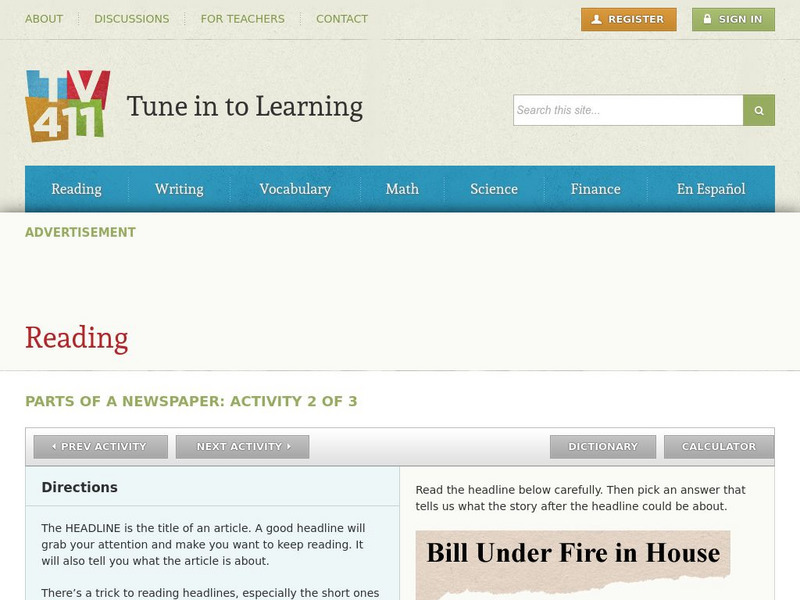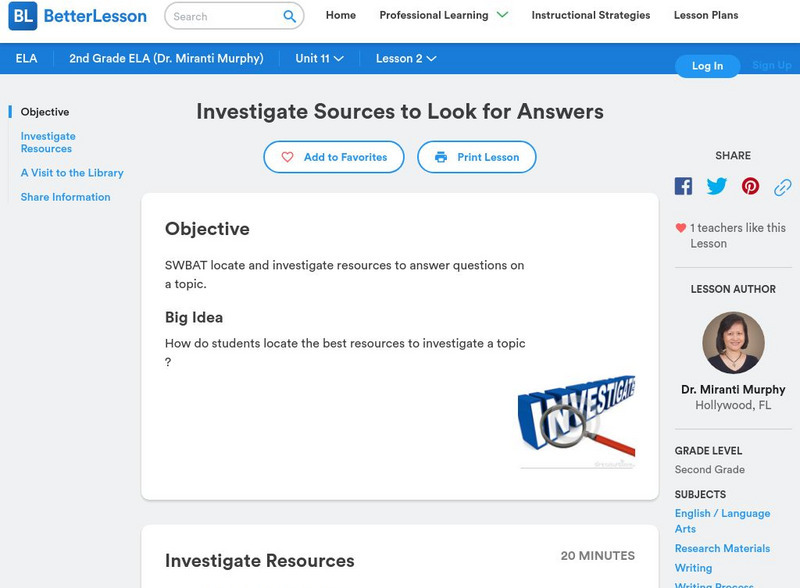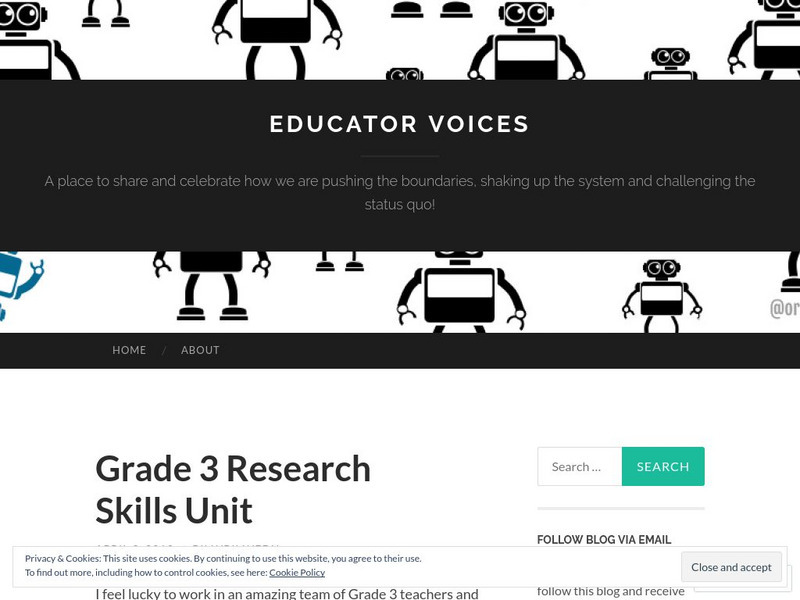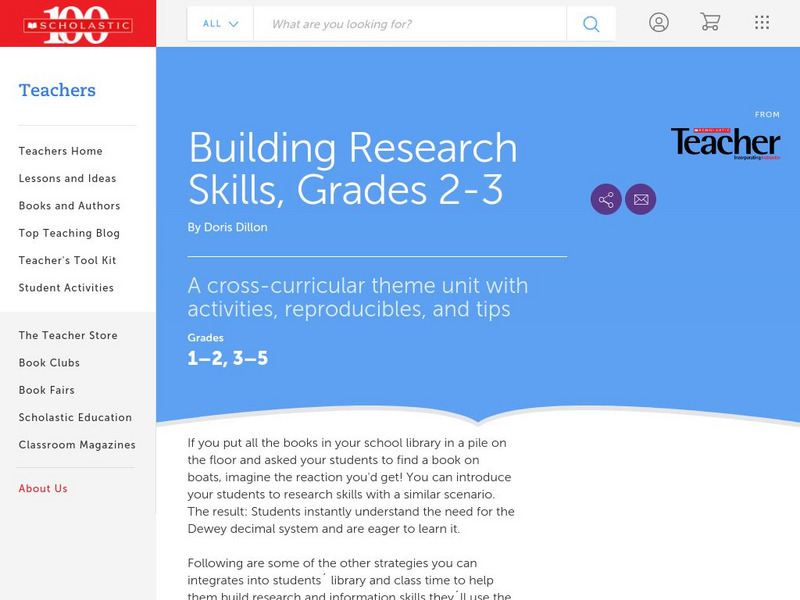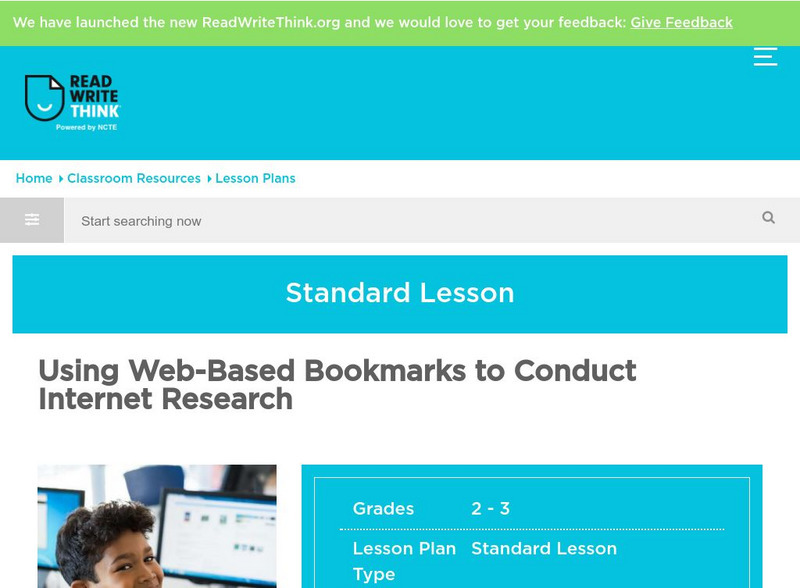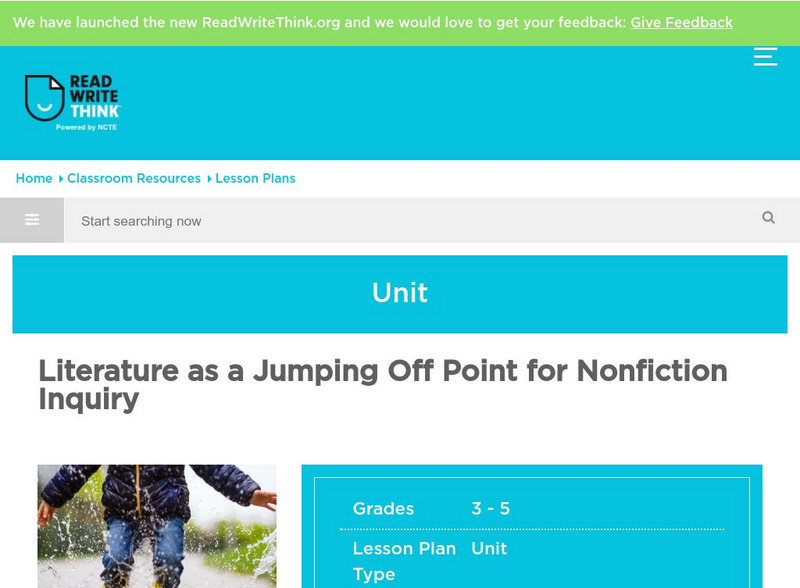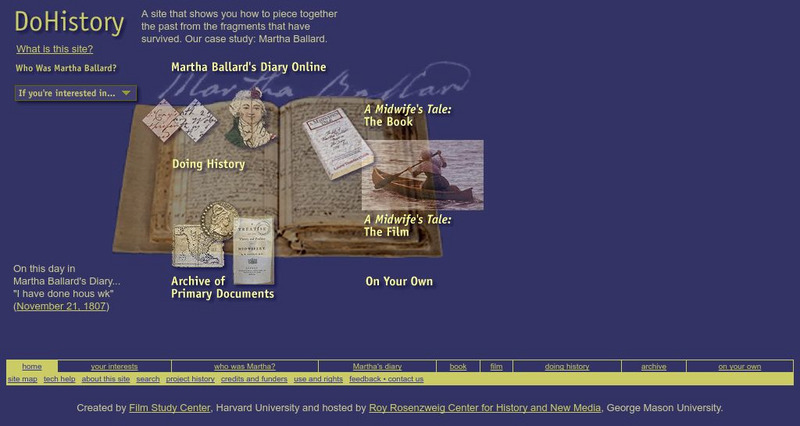Education Development Center
Tv411: Reading: Parts of a Newspaper: Activity 2 of 3
This newspaper activity requires students to read eight headlines and then select what each would be about from the options given. When answers are submitted, an explanation is also given.
NBC
Nbc Learn
NBC Learn, the educational arm of NBC News, is dedicated to making historic stories, images, and primary source documents available on-demand to teachers, students, and parents.
Better Lesson
Better Lesson: Investigate Sources to Look for Answers
Students will practice locating and investigating resources to answer questions on a topic using the FINDS research process. FINDS is an acronym describing its five-step research process: Focus, Investigate, Note, Develop, and Score. A...
CPALMS
Cpalms: Home Is Where the Heart Is: Researching Habitats
[Free Registration/Login Required] In this lesson, students will learn about different types of habitats as they gather information based on provided research questions. Students will summarize the information from their research in an...
Utah Education Network
Uen: Cool Tools for Finding Information (Grade 3 4)
Identify text structures in various informational sources.
Better Lesson
Better Lesson: Researching a Topic: Teaching Students to Research Information
Students will conduct a short research project about a topic. This lesson focuses on how to find the information needed on their chosen topic.
Other
Educator Voices: Grade 3 Research Skills Unit
Describes the process teachers went through to create a lesson unit where students first brainstormed what it means to do research, then were tasked with choosing a topic, researching it, and presenting on it several days later. The...
Library of Congress
Loc: Teachers: Using Primary Sources
The Library of Congress provides teachers with a framework that will help integrate primary sources into all areas of the curriculum. Sections include "Why to Use Primary Sources," "Citing Primary Sources," and "Finding Primary Sources."
Scholastic
Scholastic Instructor: Building Research Skills 2 3
Check out this site to learn more about building research skills for grades 2-3. This site offers suggestions for activities that will sharpen your abilities.
Polk Brothers Foundation Center for Urban Education at DePaul University
Depaul University: Center for Urban Education: K Plus [Pdf]
Students can use this information to collect facts about a topic. Students will collect information but record the "gold standard" of facts only.
Polk Brothers Foundation Center for Urban Education at DePaul University
De Paul University: Center for Urban Education: I Can Locate and Classify Information [Pdf]
A blank T-Chart is provided for students to use as they sort facts into two categories. Students will classify science information with this aid.
Other
Cable News Network, Inc.: Learning Resources: Story Archives
Links to various new stories sorted alphabetically by title and by category. Each story is available in full story, abridged story, or story outline format.
ReadWriteThink
Read Write Think: Double Entry Journal
A printable double-entry journal page along with directions on how to use this type of graphic organize, as well as lists of teaching ideas and related resources.
ReadWriteThink
Read Write Think: Using Web Based Bookmarks to Conduct Internet Research
The important thing about this instructional activity is that it connects literature and science. The Important Book by Margaret Wise Brown provides a model for original student poems about a content area topic. Web-based bookmarks guide...
ReadWriteThink
Read Write Think: Comprehending Nonfiction Text on the Web
Contains plans for three lessons designed to improve comprehension of nonfiction, especially nonfiction texts on the web. It focuses on identifying text features, locating specific information, and generalizing that information. In...
ReadWriteThink
Read Write Think: Literature in Nonfiction Inquiry
This lesson plan involves students working in groups after reading a work of literature to develop text sets. Included in the lesson plan is an overview, practice, objectives, resources, preparation, and more.
ReadWriteThink
Read Write Think: Question and Answer Books From Genre Study to Report Writing
Contains plans for eight lessons that explore Question and Answer Books and ask learners to do research in order to write their own. In addition to objectives and standards, these instructional plans contain links to sites used in the...
ReadWriteThink
Read Write Think: Research Building Blocks: Skim, Scan, and Scroll
Contains plans for two lessons on locating supporting details that are part of a larger unit on researching a state symbol. It works on skills like determining the most important information, using key words to identify relevant...
ReadWriteThink
Read Write Think: Star Search: How Do I Find the Books I Need?
Lesson which outlines the STAR process for finding resources in a library. Learners are taught to select appropriate search tools, subject headings, and resources.
ReadWriteThink
Read Write Think: Using Science Texts to Teach the Organization of Nonfiction
Contains plans for three lessons that use science textbooks to teach about the organizational features of nonfiction such as labels, captions, headings, and fonts. In addition to objectives and standards, this instructional plan contains...
Other
School Library Services: For Teachers: Research Assignments
This simple page does a good job of articulating why research is an important process to teach to students, and it also provides a number of resources for teachers planning to do this.
Other
Do History: Using Primary Sources
This site explains the difference between a primary and secondary source. It also provides students with questions to ask when gathering evidence about a primary source document.
Library and Archives Canada
Nlc: Defining Primary and Secondary Sources
Libraries and archives hold documents and books that can be used for your research projects. Learn how to divide and identify them into primary and secondary sources in this tutorial.
ReadWriteThink
Read Write Think: Research Building Blocks: "Cite Those Sources!"
Contains plans for two lessons about the research process. Students discuss plagiarism, practice paraphrasing, and cite sources. In addition to objectives and standards, these instructional plans contain links to sites used in the...


